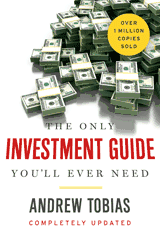The Only Investment Guide You'll Ever Need
The Only Investment Guide You'll Ever Need is a book written by Andrew Tobias published in 1978 that concerns commonsense rules that the ordinary saver can live by.
 | |
| Author | Andrew Tobias |
|---|---|
| Country | United States |
| Subject | Personal finance, personal investing |
| Published |
|
| Pages | 163 |
| ISBN | 9780151699414 |
| OCLC | 3379935 |
| 332.67 T629o | |
| LC Class | HG4521.T6 |
In short, the book advises the following:
1. No reliable methods exist of speedily accumulating vast riches.
2. One's income should exceed one's expenditures. (The book describes elementary methods to preserve one's capital.)
3. If one's expenditures exceed one's income, one should determine the nature of the expenditures and whether they can be foregone with equanimity.
4. One should beware of financial advertising. The advertisers and the financial institutions who offer it often have interests that run counter to those of the small investors whom it targets.
5. One should put one's first several thousand dollars into an account which is unlikely to lose its nominal value. (The book discusses such accounts. It also discusses bonds, not all of which can be sold indefinitely at par.)
6. One should employ tax-sheltered accounts to invest for one's retirement and for advanced academic education of one's progeny.
7. One should commit a fixed sum to no-load, low-expense stock index mutual funds every month for the remainder of one's term in the labor market. One should not commit less money than usual after a severe or prolonged market decline. Nor should one commit more money than usual after the market has ascended sharply for years. (The book discusses common stocks, their advantages and hazards as investment media.)
8. One cannot reliably achieve higher returns from the stock market than the market average, no matter how much time and effort one devotes to the task. And one can achieve nearly the same return as the market average almost without devoting time or effort to the task by periodically committing a fixed sum to index funds. Therefore, one should make the periodic commitment of one's money and return to one's regular routine.
9. One should omit complex, laborious, expensive, unreliable tactics that are alleged by some to enable one to achieve higher returns than the stock market average. (The book discusses an assortment of them and explains why one should not devote much time, effort, or expenditure of money to them.) One should merely periodically commit a fixed sum to index funds.
10. Investing in commodities, or coins, stamps, automobiles, collectables, autographs, pictures, art or anything like that is not worth the cost for the amateur investor because of 2 reasons: You are not an expert, so you will probably be buying from an expert. Second, even if you buy at a good price, you will be selling to an expert, and lose money by selling to one. (pg 10)
11. Low Price-Earnings stocks beat the market the majority of the time. If all stocks are high PE stocks, wait 6 months for the market to crash.(pg 86)
12. Buy stocks that have dividends at least equal to the amount you would find at a bank.(pg 81)
13. Only invest money you do not need for the next 5 years, also diversify by not buying all stocks at same time, or with same company. (chapter 5)
See also
- The Invisible Bankers: Everything the Insurance Industry Never Wanted You to Know (book)